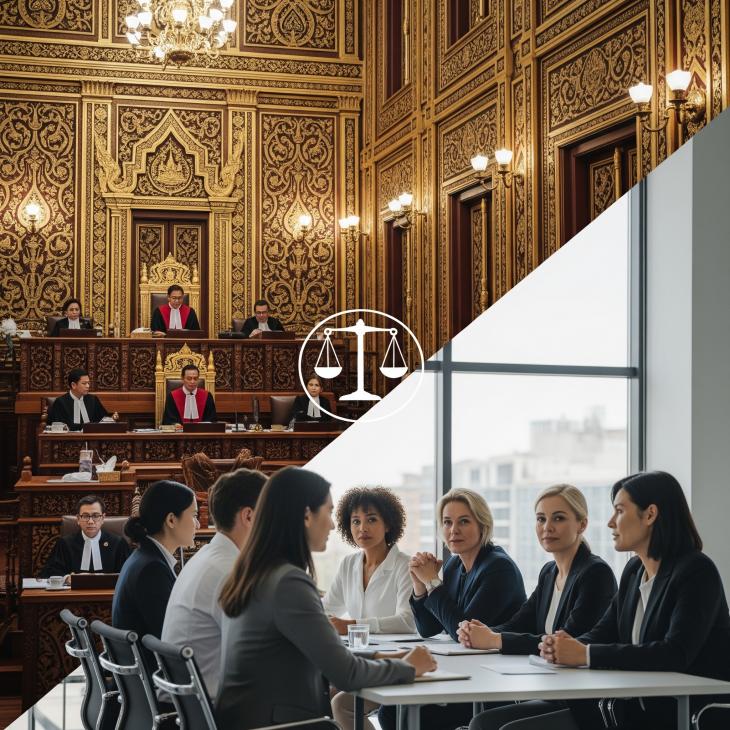Resolving Business Disputes in Thailand: A Foreign Business Guide to Litigation vs. Arbitration
Business disputes are an unfortunate reality. For foreign companies in Thailand, choosing between litigation or arbitration can be critical. Let's explore the options.
Understanding Business Disputes in Thailand for Foreigners
When commercial disagreements arise in Thailand, foreign businesses need a clear understanding of the local legal landscape. Disputes can range from contractual breaches and partnership disagreements to intellectual property infringements or debt recovery. The chosen resolution method can significantly impact the outcome, cost, and time involved. Understanding the nuances of Thai law and procedure is paramount, and often requires expert legal guidance.
Litigation in Thai Courts: The Traditional Path
Litigation involves resolving disputes through the formal Thai court system. Thailand has a civil law system, and court proceedings are primarily conducted in the Thai language.
Pros of Litigation for Foreign Businesses:
- Established Procedures: The court system has well-defined rules and procedures, offering a degree of predictability.
- Right of Appeal: Decisions from lower courts can typically be appealed to higher courts (the Court of Appeal and the Supreme Court), providing an opportunity for review.
- Enforceability within Thailand: Judgments from Thai courts are directly enforceable within Thailand.
- Potentially Lower Initial Costs (in some cases): Court fees might initially seem lower than some arbitration administrative fees, though overall costs can escalate.
Cons of Litigation for Foreign Businesses:
- Lengthy Process: Thai court proceedings can be notoriously slow, often taking several years to reach a final judgment, especially if there are appeals.
- Public Nature: Court proceedings and judgments are generally public, which may not be desirable for businesses wishing to maintain confidentiality.
- Language Barrier: All proceedings are in Thai. Foreign parties will require translators and interpreters, adding to costs and potential for miscommunication.
- Formality and Rigidity: Court procedures are formal and offer less flexibility than arbitration.
- Enforcement of Foreign Judgments: It's important to note that foreign court judgments are generally not directly enforceable in Thailand. A new lawsuit must be initiated in Thai court, where the foreign judgment can be submitted as evidence.
- Discovery Limitations: Discovery processes are more limited compared to common law jurisdictions, which can be a disadvantage.
Arbitration in Thailand: An Alternative Approach
Arbitration is an alternative dispute resolution (ADR) method where parties agree to submit their dispute to one or more neutral arbitrators, whose decision (the arbitral award) is typically binding.
Pros of Arbitration for Foreign Businesses:
- Neutrality and Choice of Arbitrators: Parties can often choose arbitrators with specific expertise in the relevant industry or legal area, and can select a neutral venue and language for proceedings (often English).
- Confidentiality: Arbitration proceedings are private and confidential, protecting sensitive business information.
- Flexibility: Parties have more control over the procedural rules, timeline, and overall process.
- Potentially Faster: Arbitration can often be quicker than litigation, though this is not always guaranteed.
- International Enforceability: Thailand is a signatory to the New York Convention on the Recognition and Enforcement of Foreign Arbitral Awards. This means arbitral awards made in Thailand are generally enforceable in other member countries, and foreign arbitral awards are enforceable in Thailand, subject to certain conditions. This is a significant advantage over court judgments for international disputes.
- Expertise of Arbitrators: Parties can select arbitrators with specialized knowledge relevant to the dispute.
- Facilitation for Foreign Lawyers: Foreign lawyers may be permitted to represent parties in arbitration proceedings in Thailand under certain conditions.
Cons of Arbitration for Foreign Businesses:
- Cost: Arbitrators' fees and institutional administrative fees can be substantial, sometimes making arbitration more expensive than litigation, especially for smaller claims.
- Limited Grounds for Appeal: Challenging an arbitral award is generally more difficult than appealing a court judgment, with limited grounds for doing so.
- Enforcement Still Requires Court Action: While enforceable, arbitral awards (both domestic and foreign) must still be recognized and enforced by a Thai court if voluntary compliance is not forthcoming.
- Potential for "Splitting the Baby": Some perceive a tendency for arbitrators to compromise rather than deliver a clear win/loss outcome, though this is a debated point.
Key Considerations for Foreign Businesses When Choosing
When deciding between litigation and arbitration in Thailand, foreign businesses should consider:
- Contractual Agreements: Does your contract contain an arbitration clause? If so, this will generally dictate the dispute resolution method.
- Nature and Complexity of the Dispute: Highly technical or industry-specific disputes may benefit from arbitrators with relevant expertise.
- Value of the Claim: For lower-value claims, the cost of arbitration might be prohibitive.
- Need for Confidentiality: If privacy is crucial, arbitration is preferable.
- Time Sensitivity: While not always faster, arbitration often offers a more streamlined and potentially quicker resolution.
- Location of Assets and Enforcement: If assets are located outside Thailand, the international enforceability of arbitral awards under the New York Convention is a major advantage for arbitration. If assets are solely in Thailand, Thai court judgments are directly enforceable.
- Relationship with the Other Party: Arbitration can sometimes be less adversarial and more conducive to preserving business relationships.
How PS Law & Business Can Help
Navigating business disputes in a foreign jurisdiction requires skilled legal counsel. PS Law & Business provides expert advice and representation for foreign businesses in Thailand. We can assist with:
- Advising on the most appropriate dispute resolution method for your specific situation.
- Drafting effective arbitration clauses in commercial contracts.
- Representing your interests in both litigation and arbitration proceedings in Thailand.
- Assisting with the enforcement of domestic and foreign arbitral awards.
Our team understands the challenges faced by foreign enterprises and is committed to achieving the best possible outcomes for our clients.
Frequently Asked Questions (FAQ)
Q1: Is arbitration always faster than litigation in Thailand?
A1: While arbitration is often perceived as faster, this is not always the case. The speed of arbitration depends on factors like the complexity of the dispute, the availability of arbitrators and parties, and the chosen procedural rules. However, it generally avoids the multi-tiered appeal process common in Thai litigation, which can save considerable time.
Q2: Can a foreign company use English in Thai court proceedings?
A2: The official language of Thai courts is Thai. Foreign companies will need to have all documents translated into Thai and use qualified interpreters for hearings. This adds to both the cost and duration of the proceedings.
Q3: What is the New York Convention and why is it important for arbitration?
A3: The New York Convention is an international treaty that facilitates the recognition and enforcement of foreign arbitral awards in contracting states. Thailand is a signatory, meaning Thai arbitral awards can be enforced in other member countries, and awards from other member countries can be enforced in Thailand, making arbitration a more effective tool for international disputes.
Q4: If my contract doesn't have an arbitration clause, can I still choose arbitration?
A4: Yes, parties can agree to arbitrate a dispute even after it has arisen, through a separate "submission agreement." However, it is generally more straightforward to include an arbitration clause in the initial contract.
Q5: Are the costs for litigation and arbitration in Thailand significantly different?
A5: Costs can vary greatly depending on the case. Litigation involves court fees, lawyer fees, translation, and potentially lengthy appeal processes. Arbitration involves institutional fees (if applicable), arbitrator fees, lawyer fees, and potentially venue costs. For complex, high-value international disputes, arbitration can sometimes be more expensive upfront but may save costs in the long run due to efficiency and enforceability. For smaller domestic disputes, litigation might appear cheaper initially. It's best to discuss potential costs with legal counsel.
External Links for Further Information:
- The Courts of Justice of Thailand: Official website with information on the Thai judicial system.
- Thai Arbitration Institute (TAI): Part of the Office of the Judiciary, providing arbitration services.
- Thailand Arbitration Center (THAC): An independent institution providing arbitration and mediation services.
- Ministry of Justice of Thailand: Provides oversight for various legal and justice-related affairs.



